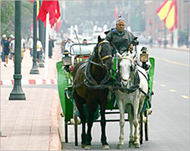The Arab Maghreb Union
The Arab Maghreb Union (AMU) is a North African Arab regional organisation composed of Algeria, Libya, Mauritania, Morocco, and Tunisia.

The organisation formed after a meeting of heads of states in Marrakech, Morocco, in February 1989. The union aims to take part in international dialogue, reinforce the independence of the member states and safeguard their assets.
The organisation, however, has been marred by differences between member states and has faced numerous challenges. It has failed to move beyond conceptualisation.
At the heart of the differences is Algeria’s support of the liberation movement the Polisario Front in its quest for independence from Morocco.
Morocco is calling for a change in the Algerian position regarding Western Sahara, a former Spanish colony south of Morocco that was transferred to the kingdom in 1974. Algeria has continuously supported Polisario.
Disputed territory
The conflict between Algeria and Morocco over Western Sahara has kept re-emerging, hampering the function of the union and showing that the bloc will not function properly until the issue is resolved.
Several attempts have been made, notably by the UN, to resolve the issue.
 |
|
The union was formed in |
However, no concrete progress has been achieved as Morocco continues to refuse any concessions that would allow the independence of Western Sahara, while Algeria maintains its support for the self-determination of the Sahara people.
In addition, a quarrel between Tripoli and Nouakchott does not make the task of reinvigorating the organisation any easier.
Mauritania has accused the Libyan secret services of being involved in a recent attempted coup against President Maaouiya Ould Sid’Ahmed Taya. Libya has denied the accusation.
Earlier Libya withdrew from the organisation after AMU members complied with the UN sanctions following the Lockerbie bombing.
Algeria plunged into internal political problems that were further complicated by the emergence of Islamist fundamentalism and terrorism in the country.
Mauritania for its part embarked into structural adjustment programmes under the auspices of the International Monetary Fund (IMF) and the World Bank.
Tunisia and Morocco shifted their attention to bilateral relations with the European Union.
Article 6 of the Constitutive Act of the Union stipulates that only the Presidential Council has the power to make decisions, which will be issued by consensus. Hence, the failure to hold a meeting of heads of state automatically hampers the work of the organisation.
The meeting of the Maghreb leaders, which has been indefinitely postponed, has consequently frozen the union’s activities.